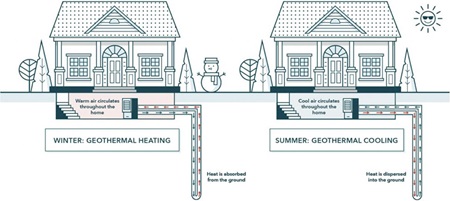Renewable Thermal Energy
Renewable energy doesn’t just mean clean electricity from solar panels and wind turbines. It also means clean thermal energy from the sun (and the Earth’s interior). Renewable thermal energy (aka “clean heating and cooling”) is a central feature of DEEP’s initiatives to decarbonize Connecticut’s residential and commercial buildings. A wide range of technologies – from heat pumps to biofuels to solar water heating – harvest renewable energy from the environment. They provide buildings with efficient, low-carbon heating and cooling and can dramatically reduce use of fossil fuels.
The agency’s development of renewable thermal policies and programs involves both the Office of Energy Supply and Infrastructure and the Office of Building and Transportation Decarbonization.

Renewable thermal technologies
Mature, readily available technologies include:
- Air-source heat pumps (consumer guide)
- Ground-source heat pumps (consumer guide; Geothermal Energy)
- Water-source heat pumps
- Heat pump water heaters (consumer guide)
- Solar water heating (consumer guide)
- Solar space heating
- Liquid thermal biofuels
- Pellet boilers, furnaces, and stoves
- Industrial waste-heat recovery

Image source: Dandelion Energy
Emerging technologies include:
- Renewable natural gas
- Enhanced geothermal
- Concentrated solar for industrial process heating
- Compost heat recovery
Are clean heating and cooling technologies a good fit for your home or business? What incentives are available? energizect.com/cleanheatcool
Publications and activity
- Comprehensive Energy Strategy scoping notice (DEEP, 2022)
- Integrated Resources Plan (DEEP, 2021) See Part III, Analysis and Recommendations Concerning a Connecticut Portfolio Standard for Thermal Energy
- Taking Action on Climate Change and Building a More Resilient Connecticut for All (Governor’s Council on Climate Change, 2021) See recommendations 9 and 10, page 34
- Progress on Mitigation Strategies Working Group Final Report (Governor’s Council on Climate Change, 2020) See chapter 3, Buildings, pages 34-71
- Compost Heat Recovery case study (DEEP, 2019)
- Comprehensive Energy Strategy (DEEP, 2018) See analysis and recommendations regarding renewable thermal technologies, pages 91-95
- An Overview of Renewable Thermal Technologies (Yale, 2017)
- Feasibility of Renewable Thermal Technologies in Connecticut (Yale, 2017)
- Waking the Sleeping Giant (International Energy Agency, 2015)
- Heating Without Global Warming (International Energy Agency, 2014)
Partners
- Northeast Energy Efficiency Partnerships
- Clean Energy States Alliance
- HeatSmart CT
- Renewable Thermal Collaborative
- Connecticut Green Bank
- Energy Efficiency Board
- Connecticut Farm Energy Program
Contact
DEEP Bureau of Energy and Technology Policy
DEEP.EnergyBureau@ct.gov

